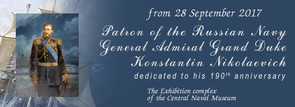Grand Duke Konstantin Nikolaevich, the second son of Emperor Nicholas I, was born on 9 (21) September, 1827 in St. Petersburg. He was prepared for maritime service from early childhood.
In 1831, his father appointed him patron of the Naval Guards and granted the title of general admiral to the four-year-old son – the rank of his grandfather Emperor Paul I. In 1832, the five-year-old Grand Duke proceeded to studying sciences and was trained on a comprehensive basis at home under the guidance of Fedor Petrovich Litke, researcher and seafarer, captain 1 rank, later - Admiral, invited as his tutor and mentor.
At the age of eight, the young Grand Duke set out on his first voyage on the Hercules warship. At the age of 17, he commanded the Ulysses brigantine, at 18 - sailed around Europe, at 20 was a commander of the Pallada frigate. In total, he guided about 50 naval campaigns.
Being a multi-talented man, Konstantin Nikolaevich was well versed in various fields of politics, science and culture. In 1848, he was promoted to Rear Admiral, appointed patron of the Sea Cadet Corps and commander of the Finnish Life Guards Regiment. In 1850, Konstantin Nikolaevich took charge of the Committee for Revision of the Corpus of Maritime Regulations, became a member of the State Council. From 1855, he took the command of the fleet and maritime administration in the capacity of minister; he put much effort for improvement and re-equipment of the Russian fleet. During his generalship of the fleet, a number of important reforms was carried out: the former sailing fleet was replaced by a steamship fleet; the term of military service of lower ranks was reduced from 25 to 10 years; corporal punishment was abolished. The journal Naval Bulletin published by the Ministry, became an aboveboard mouthpiece of new trends, publishing the articles on the issues far beyond the specific fleet profile.
Upon accession to the throne of his brother Alexander II, Konstantin Nikolaevich took an active part in the work of the Finance Committee, in the preparation of judicial and peasant reforms. Being a staunch supporter of emancipation of peasants, he headed the Committee on Peasant Problems in 1860. From 1865 to 1881 he was the Chairman of the State Council and the Admiralty Council; he held a number of honourable posts in Russia, Austria-Hungary, Prussia and Bavaria. He was an honorary member of the Imperial Academy of Sciences, the Imperial Academy of Medical Surgery, the Russian Archaeological Society, as well as the Chairman of the Imperial Russian Geographical Society.
After the death of Alexander II in 1881, Konstantin Nikolaevich was dismissed from all posts. On 13 (25) January 1892, he died in Pavlovsk after a grave and extended illness and was buried in St. Peter and Paul Cathedral in St. Petersburg.
























